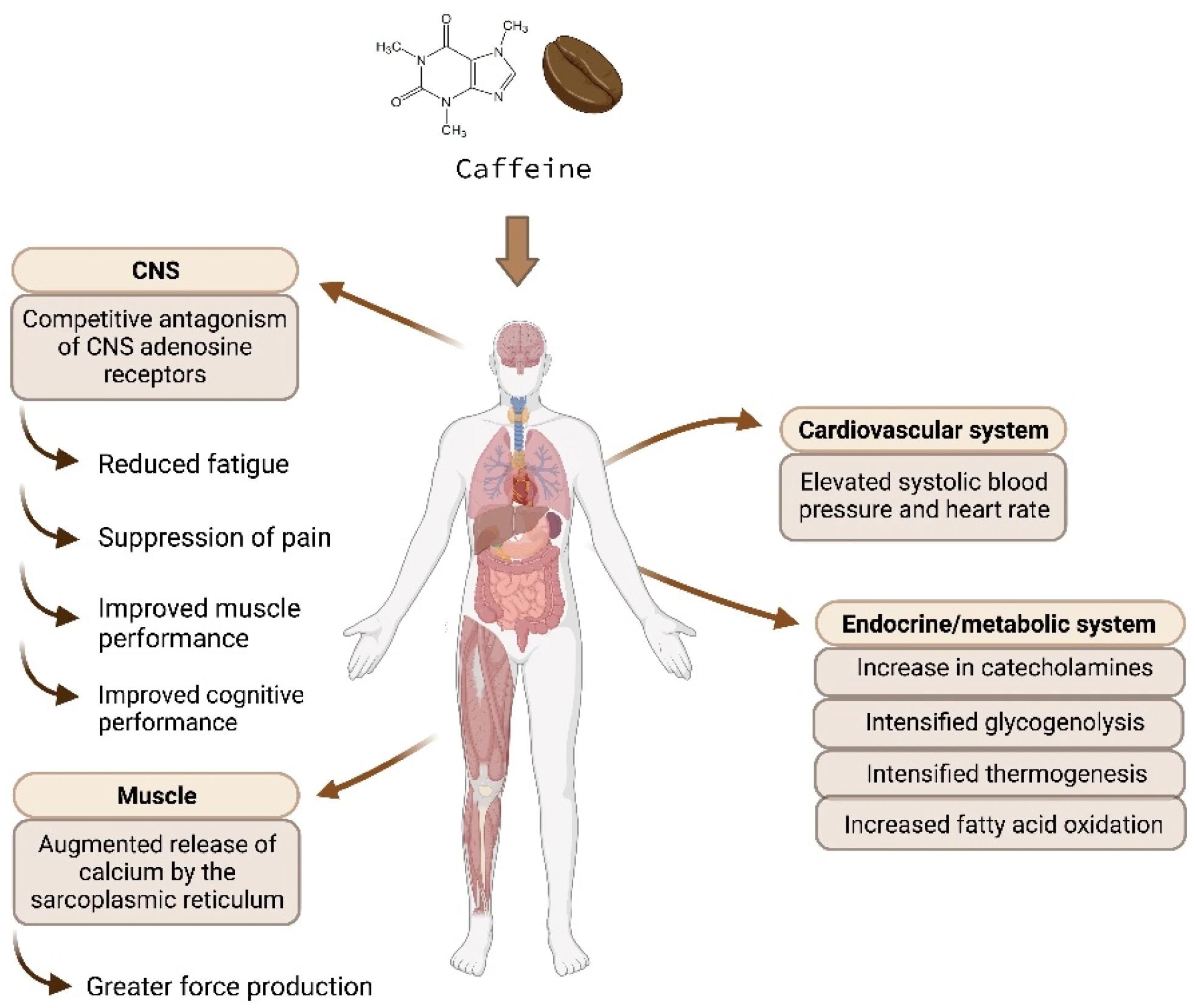Coffee beverages represent the primary and most widespread source of caffeine. The composition of coffee is highly complex, with hundreds of chemical constituents. Caffeine is also present in tea, soft drinks, cola nuts, cocoa, and pharmaceutical preparations. Caffeine acts as a neurostimulant, enhancing energy substrate levels and exercise performance. The present study reviewed the effects of coffee and caffeine on metabolism and exercise.
 Study: Extrapolating the Coffee and Caffeine (1,3,7-Trimethylxanthine) Effects on Exercise and Metabolism—A Concise Review
Study: Extrapolating the Coffee and Caffeine (1,3,7-Trimethylxanthine) Effects on Exercise and Metabolism—A Concise Review
Mechanisms of caffeine actions
Caffeine mainly acts by elevating catecholamine levels and inhibiting adenosine receptors. These actions contribute to acute effects like increased heart rate, energy expenditure, lipolysis, hyperinsulinemia, and hyperglycemia. Chronic effects of caffeine/coffee include weight loss, fat loss, improved insulin sensitivity, and muscle hypertrophy.
Besides, the proposed mechanisms of caffeine as a stimulator of calcium release channels or a phosphodiesterase inhibitor are considered less significant, as these require far higher levels of caffeine than would be achieved from regular coffee intake.
Caffeine metabolism and pharmacokinetics
A study observed a delayed response of free fatty acids when caffeine was administered to obese individuals compared to eutrophic subjects. This indicated the distinct metabolic effects of caffeine in obese and non-obese individuals. In the study, caffeine-naive individuals received caffeine or placebo before a three-hour seated rest or 90-minute treadmill activity.
Obese participants had a higher absorption rate constant, a longer half-life, and a lower elimination rate constant of caffeine than their lean counterparts. The study also noted that exercise consistently decreased the maximum serum concentration of caffeine in obese individuals. These findings suggested that obesity and exercise could alter the pharmacokinetics of caffeine.
 Action mechanisms of caffeine (CNS: central nervous system).
Action mechanisms of caffeine (CNS: central nervous system).
Effects of coffee and caffeine on physical performance
Athletes have long been aware of the benefits of caffeine and consume it near competitive events. One study observed that caffeine ingestion increases exercise endurance and plasma epinephrine. A study evaluating the effects of regular coffee, caffeine capsules, and decaffeinated coffee reported that caffeine capsules increased endurance time by 31% and 22.8% compared to placebo and decaffeinated coffee, respectively.
While caffeine concentrations in plasma were similar to those of coffee and caffeine capsules, the adrenaline/epinephrine response with coffee was nearly half that of caffeine capsules. As such, the investigators proposed that cholinomimetic factors in coffee might suppress sympathetic responses. In a different study, administering rats with a compound derived from coffee reduced blood pressure and heart rate.
Another study evaluated the peak concentration and time to peak between caffeine capsules, cola, and coffee intervention arms. This showed that the mean peak caffeine concentrations in saliva were not different between the cola and coffee groups. However, salivary caffeine levels were higher, and the time to peak was shorter after coffee consumption than with capsules for the same dose. Furthermore, a group of researchers examined the ergogenic effects of anhydrous caffeine and placebos (water with quinine and decaffeinated coffee) during a cycling test. They observed that caffeine and coffee improved the performance of cyclists by similar magnitudes. Another study demonstrated that coffee intake enhanced repeated sprint performance but did not affect the strength exercises of resistance-trained males.
Insulin sensitivity and thermogenic effects of caffeine
Acute caffeine doses can impair glucose tolerance and insulin sensitivity by inhibiting adenosine receptors or stimulating the release of epinephrine in the brain. Caffeine ingestion at a dose of 5 mg/kg body weight has been shown to impair insulin sensitivity to a similar extent in obese, diabetes, or lean individuals.
Moreover, caffeine intake significantly reduced insulin sensitivity even after exercise. This suggested the predominance of caffeine’s hyperglycemic effects over the beneficial effects of other coffee constituents in short-term acute trials. Chronic coffee consumption increases energy expenditure by about 100 kcal per day.
Numerous animal and human studies have reported on the anti-inflammatory properties of coffee constituents such as caffeic acid, ferulic acid, caffeine, chlorogenic acid, and trigonelline. In clinical studies, coffee intake has been shown to reduce inflammatory markers, including C-reactive protein (CRP), C-peptides, interleukin (IL)-1β, IL-18, and IL-6, among others.
Concluding remarks
Taken together, caffeine, as a supplement or in coffee, is beneficial to metabolism and improves cognition, physical performance, insulin sensitivity, and thermogenesis. While generally safe for use at low and moderate doses, genetic variability and the lack of standardized doses may produce divergent results. As such, it is necessary to define caffeine supplementation protocols and dosages to investigate its effects on metabolic diseases.